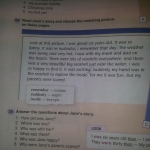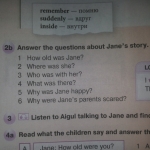переведите текст и ответьте на вопросы по английски.
10-11 класс|
|
пожалуйста
посмотри на картинку.
Мне было примерно 6 лет.
Это было очень весело.
Я был в Австралии.
Я помню тот день.
Была солнечная,жаркая погода.
Я был на пляже с мамой и папой.
Там везде было много ракушек.
И рядом с водой лежала красивая большая ракушка.
Я был очент рад своей находке.
Это было безумно чудесно.
Вдруг моя рука оказалась в ракушке,чтобы исследовать внутренность.
Для меня это было весело,но мои родители испугались
Answers for the questions
1. Jane was 6 years old
2. She was in Australia
3.She was with hes Mom and Dad
4.there were a lot of seashells
5. she was so happy to fond a big and beautiful seashell near the water
6. her parents scared because her hand was in the seashell
Другие вопросы из категории
e're going to the Egypt for two months! 2. She (be) really responsible, but now she's really irresponsible. 3. I never (eat) American food but now I go to McDonald's twice a week . 5. I go ) to the disco four times a week ,but not any more .I'm too busy. 4. She ( go ) to the opera every week ,but she doesn't have time now. 6. He ( not like)apples, but now he loves to eat them. 7. (you / wear ) formal clothes when you went to school? 8. (they / go ) to the seaside a lot when they were young?
1) You drink tea with milk every day
2)I went to bed late yesterday
3) He likes coffee
4)We will eat lunch in the park tomorrow
5) She played piano a letter tomorrow
director.
2.the nephew of Sir Charles.
3.the birthday of my boy-friend.
4.the duties of men-srvants.
5.the last letter of my mother-in-law .
6.the recent statement of President Bush.
7.the early poems of Robert Burns .
8.an interval of ten minutes .
9.a distance of five miles
10.the crew of the ship
11.the population of England
12.for the sake of economy
13.the mother of Mary and John
14.the rooms of the daughter and the son
15.the new house of the Parkers
16.the latest record of the champion.
стихотворение на русский язык,но чтобы была рифма:
Читайте также
ответить на вопросы виде текста 8-10 речень
вопросы (вторая фотка)
state.
The main aim of law is to consolidate and safeguard the social and state system and its economic foundation.
The system of law in our country consists of different branches of law.
Constitutional law is a leading branch of the whole system of law. Its principal source is the country’s Constitution. It deals with social structure, the state system, organization of state power and the legal status of citizens.
Administrative law is closely connected with constitutional law but it deals with legal forms of concrete executive and administrative activity of the government and ministries.
Financial law regulates the budget, taxation, state credits and other spheres of financial activity.
Civil law is connected with relations in the economic sphere of social life, with relations involving property, its distribution and exchange. The right в property is the central institution of civil law.
The rules of labour law include the legislation on the labour of industrial and office workers and matters arising from labour relations.
Criminal law defines the general principles of criminal responsibility, individual types of crimes and punishment applied to criminals. Criminal law takes the form of а criminal code consisting of а general and special part.
Ответьте на вопросы
1. What is law? __________________________________________________________________________________________________________________________________________________________________
2. What is the main aim of law? __________________________________________________________________________________________________________________________________________________________________ 3. What branches of law does the system of law in our country consist of? __________________________________________________________________________________________________________________________________________________________________
4. What does each branch of law deal with? __________________________________________________________________________________________________________________________________________________________________
KINGDOM
1. Britons, and the English in particular, are notoriously undemonstrative. The “stuff upper lip” is not just the stuff of fiction and emotional displays, positive or negative, are generally frowned upon. Gestures such as backslapping and hugging are discouraged and a wide distance should be maintained between participants in a conversation. Maintaining eye contact may be necessary when you are trying to emphasize important points but you must avoid any temptation to “eye-ball”. Talking loudly is unacceptable and shouting is beyond the pale. Some old-fashioned interlocutors may not hear you if you have your hands in your pockets. The British do not gesticulate frantically.
2. Introductions can be tricky. Ideally the British prefer third-party introductions but in certain situations, like a drinks party, it may not always be possible and, though awkward, you may just have to go ahead and introduce yourself. Firm handshakes are the norm as part of a formal introduction but may not be expected at subsequent meetings or on social occasions; a gentleman should always wait for a woman to proffer her hand before squeezing it gently. The continental habit of exchanging kisses has gained currency especially amongst the young and the affected but is not recommended for visitors – even the natives are unsure of the correct procedure.
3. “How do you do?” is a greeting not a question. It is used when people are introduced for the first time only and the correct response is to repeat “How do you do?” which is a more or less sincere enquiry as to your well-being.
4. This emotional detachment or even apparent indifference also explains the British abhorrence of Americanisms such as “Have a nice day”. The objection lies not in the sentiment itself but in the lack of sincerity that is implied to the stand-offish British mentality.
5. If the British use few words, it is because they prefer to mean those they do use. They are polite and courteous for the most part. They expect to be treated with respect, in turn for which they will treat you with respect, so: – if there is a queue, go to the back of the line and wait patiently; - do not use the “V” – sign (raising the index and middle fingers) unless you are sure which is the Churchillian version signifying peace or victory (palm outwards); the use of the alternative version (palm inwards) is less common nowadays but is still vulgar and offensive.
6. A service charge of 10-15 % is almost always included in hotel and restaurant bills and you should be wary of establishments that leave the credit card slip open for you to include an additional contribution (if you wish to reward exceptional service give cash directly to the staff). Do not tip bar staff in pubs where there is no table service. Otherwise taxi drivers (especially in London), hairdressers, porters, etc. will expect 10-15 % or a couple of pounds, whichever is the greater.
IV. Ответьте на вопросы к тексту:
1. What kind of people are Britons?
2. What kind of introductions do the British prefer?
3. What does “How do you do?” mean in Britain?
4. What are the norms of public behaviour in Britain?
Чем занимаешься?(вообще) 6. Чем занимаешься?(сейчас) 7. Что ты ешь?(сейчас) 8. Что ты ешь на завтрак по утрам? 9. Откуда ты? 10. Сколько тебе лет? 11. Кто твои друзья? 12. Чем они занимаются? 13. Есть ли у тебя дети? 14. Как жизнь? 15. Ты счастлив? 16. Сколько сейчас времени? 17. Какое твое любимое занятие? 18. У тебя много друзей? 19. Что ты хочешь от жизни?
TEXT
The Disney Story
The greatest cartoon-maker in cinema history was Walt Disney. He produced his first (black and white) Mickey Mouse cartoon in 1928. It was an instant hit with both children and adults. More cartoons followed, including `Flowers and Trees`. Then three years later Disney created his second cartoon superstar –Donald Duck. By this time he had his own studio and a large team of cartoonists. These were the people who helped to draw the thousand `cells` for `Snow White And the Seven Dwarfs`.
A magical mixture of fantasy, comedy, music and colour, `Snow White` was a landmark in a cartoon history. It was also a huge hit with international audiences, who demanded more full-length cartoons.
They say, Disney seldom praised anybody and he didn't like to show his feelings and emotions. But once when he saw a few episodes from Bambi and turned to the animators there were tears in his eyes. This was how Disney approved of their work. But it happened only twice in thirty-nine years.
Disney respected people who could make some¬thing with their hands. He especially respected the carpenter working in the studio. Although every-one called Disney Walt and he called everybody by their first name, the carpenter was an exception to the rule. Disney always called him Mr. Rogers.
When Walt Disney was making a film, he al¬ways thought not only about children but also about grown-ups. That's why he tried to touch up-on the subjects of nature and life, he wanted to make people think about life, love, justice, about good and evil powers. There were episodes in Dis¬ney's films that did not leave a dry eye in the cine¬ma. At the same time all Disney's films are full of optimism and have a happy ending. A great num¬ber of people were brought up on Walt Disney's films and they are grateful to him for these unfor¬gettable moments in their childhood.
It may seem strange that after the success in animation, Disney directed his energies to a new field — constructing Disneyland. Everybody thought that it was impossible to realize this idea but Disney saw it as continuation of what he had been doing all his life. Disneyland (in California) and Disneyworld (in Florida) receive millions of visitors every year.
2. Ответьте на вопросы по тексту
1. Who was the greatest cartoon maker in the world?
2. When did Walt Disney produce his first cartoon film?
3. What film by Walt Disney do you know?
4. What film was a huge hit with international audiences?
5. Are all Disney`s films full of optimism?
6. What people did Disney respect?
7. Where did Walt Disney direct his energy after success in animation?
8. What did he wan to make people think about?
9. What parks of attractions did he create?
10. How many visitors do they receive every year?
 сервис вопросов и ответов
сервис вопросов и ответов
